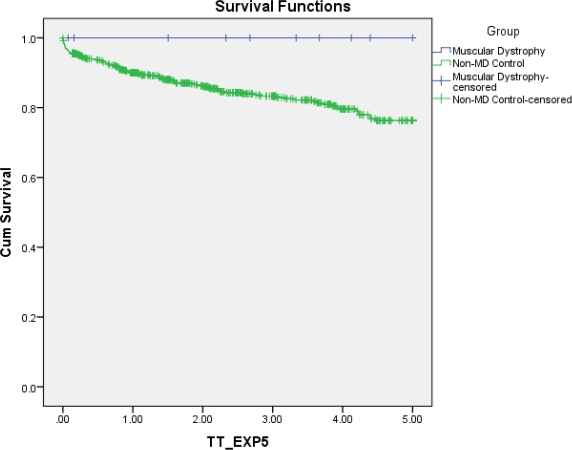The Secret is Selection of Muscular Dystrophy for Success after Heart Transplant
Cedars Sinai Medical Center, Los Angeles.
Meeting: 2018 American Transplant Congress
Abstract number: B59
Keywords: Heart transplant patients
Session Information
Session Name: Poster Session B: Heart and VADs: All Topics
Session Type: Poster Session
Date: Sunday, June 3, 2018
Session Time: 6:00pm-7:00pm
 Presentation Time: 6:00pm-7:00pm
Presentation Time: 6:00pm-7:00pm
Location: Hall 4EF
Purpose: Patients with muscular dystrophy may have an associated cardiomyopathy, resulting in advanced heart failure requiring transplantation. However, the skeletal muscle dysfunction can result in respiratory impairment, dysphagia, and inability to participate in rehabilitation after heart transplantation. The purpose of this study was to describe the characteristics and outcomes of muscular dystrophy patients undergoing heart transplantation at our center.
Methods: We reviewed patients at our center status post heart transplantation between 2010 and 2017. Of the 646 patients, we identified 10 with muscular dystrophy. The demographics, clinical characteristics, and outcomes of these 10 patients with muscular dystrophy were compared to the 646patients without muscular dystrophy transplanted during this time period.
Results: The muscular dystrophy patients were all deemed acceptable to proceed by a neurologist with expertise in muscular dystrophy. They were younger (45 years vs 56 years; p = 0.006); had younger donors (27 years vs 35 years, p = 0.05); had lower creatinine (0.95 mg/dL vs 1.15 mg/dL; P = 0.01); and less pre-transplant diabetes (13% vs 52%; p = 0.03). There was no difference in sensitization, CMV IgG mismatch status, or Status 1A listing. The muscular dystrophy patients had 100% 1- and 5-year survival (Figure) and there was no difference in the incidence of cellular rejection, antibody-mediated rejection, or allograft vasculopathy between groups.
Conclusion: Patients with muscular dystrophy-associated cardiomyopathy may require heart transplantation. This analysis indicates that carefully selected patients can have excellent outcomes and therefore should be considered candidates for advanced heart failure therapies.
CITATION INFORMATION: Kittleson M., Patel J., Kransdorf E., Levine R., Dimbil S., Geft D., Chang D., Czer L., Kobashigawa J. The Secret is Selection of Muscular Dystrophy for Success after Heart Transplant Am J Transplant. 2017;17 (suppl 3).
To cite this abstract in AMA style:
Kittleson M, Patel J, Kransdorf E, Levine R, Dimbil S, Geft D, Chang D, Czer L, Kobashigawa J. The Secret is Selection of Muscular Dystrophy for Success after Heart Transplant [abstract]. https://atcmeetingabstracts.com/abstract/the-secret-is-selection-of-muscular-dystrophy-for-success-after-heart-transplant/. Accessed February 16, 2026.« Back to 2018 American Transplant Congress

